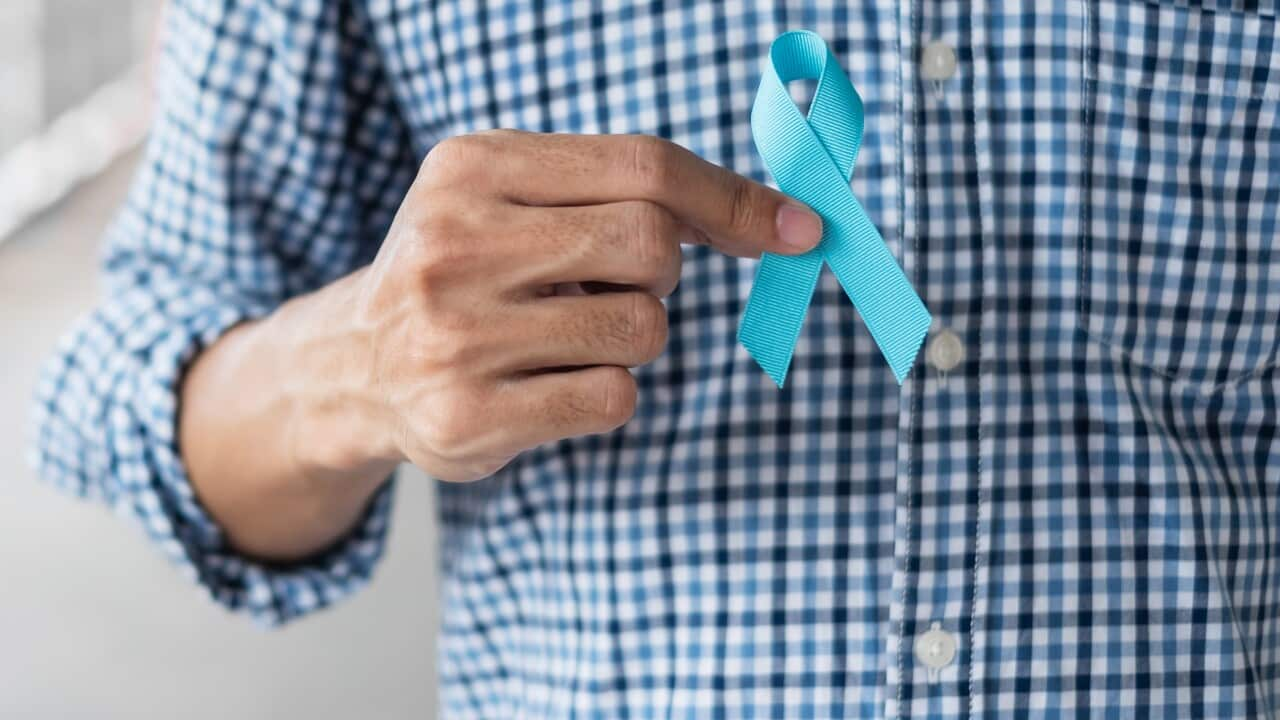Bernard Lefers is from Nouméa, the capital of New Caledonia, and has prostate cancer. About 1.3 million men are diagnosed with the disease worldwide each year.
He is currently doing well after taking part in a trial at St Vincent’s Hospital Sydney, which is using a new class of treatment.
“I'm feeling good, very good. I can do everything I want," the 61-year-old said. "I can go swimming, go hunting and go fishing."
“The treatment is not hard. Chemotherapy is very difficult, a very hard treatment. It makes you very tired.”  Prostate cancer is the most commonly diagnosed cancer in Australian men. Estimates suggest that 16,741 Australian men will be diagnosed this year.
Prostate cancer is the most commonly diagnosed cancer in Australian men. Estimates suggest that 16,741 Australian men will be diagnosed this year.

Bernard Lefers with his doctor, Professor Louise Emmett, in Sydney. Source: SBS Sandra Fulloon
Bernard was one of 56 men who took part in the LuPIN trial, which uses two new drugs in combination. His doctor and trial supervisor, Professor Louise Emmett, says Bernard had a very good response to the drugs, with a marked reduction in tumours.
“This trial is part of a series using a new group of drugs which is offering real hope for men with prostate cancer,” she said.
“When Bernard first presented to us, he was very short of breath, very symptomatic with late-stage prostate cancer. With each treatment, his symptoms progressively improved.”
Bernard is a retired police officer and was first diagnosed in August 2015. The cancer later spread to his bones and lungs. His treatment in Australia was subsidised by a French government organisation.
“Bernard had already failed at least two lines of chemotherapy and all other available treatments. So this was really the last option left available to him,” Professor Emmett said.
But when the COVID-19 pandemic hit, Bernard was forced to stop the trial and go home to Nouméa. His tumours later returned.
After being granted a medical exemption, he has now been able to return to Sydney for ongoing medical treatment that is unavailable in New Caledonia.
"I am determined to continue. It's not the end for me, I want to fight, you know?" he said.
How does the new treatment work?
The LuPIN research is gaining international attention. It combines two drugs - Lutetium PSMA and Veyonda.
Lutetium PSMA is injected intravenously to deliver a small amount of radioactivity to tumours without adversely affecting healthy cells.
In by the Australian and New Zealand Urogenital and Prostate Cancer Trials Group (ANZUP), and published in science journal the Lancet, Lutetium PSMA was found to have improved treatment responses, quality of life and pain control when compared with chemotherapy for Australian men with end-stage prostate cancer. The second drug, Veyonda, was developed by Australian doctor Graham Kelly, who was also diagnosed with prostate cancer.
The second drug, Veyonda, was developed by Australian doctor Graham Kelly, who was also diagnosed with prostate cancer.

Professor Louise Emmett is supervising several prostate cancer trials. Source: SBS Sandra Fulloon
He has formed an Australian clinical-stage drug development company, Noxopharm, to focus on the treatment of cancer and septic shock.
“We believe that Veyonda works by enhancing the body's ability to fight cancer, and what we're talking about now is the immune system,” the 75-year-old said. The final results of the St Vincent’s LuPIN combination drug trial will be published later this year, citing a response rate of 61 per cent.
The final results of the St Vincent’s LuPIN combination drug trial will be published later this year, citing a response rate of 61 per cent.

Dr Graham Kelly has developed Veyonda. Source: SBS Sandra Fulloon
“We are delighted with the early results from this most recent study,” Prostate Cancer Foundation of Australia CEO Jeff Dunn said.
“There's some exciting research work being done in this country, in fact, world-leading research work in the treatment of prostate cancer.
“For those men living with more advanced disease, it really is a game-changer.” Professor Emmett is campaigning to make Lutetium PSMA more widely available. At this time, a course costs $30,000.
Professor Emmett is campaigning to make Lutetium PSMA more widely available. At this time, a course costs $30,000.

Bernard, right, is grateful to have time with his family. Source: Supplied
Of the 56 men who started the trial, some have died. Bernard, and others, are still going strong.
“The last four years have been exceptional, very beautiful for me, and for my wife and all my family,” he said.
“Je voudrais merci. I would like to say thank you very much. Thank you very much.”
Those diagnosed with prostate cancer are advised to discuss treatment options with their doctor. For more information about prostate cancer visit




